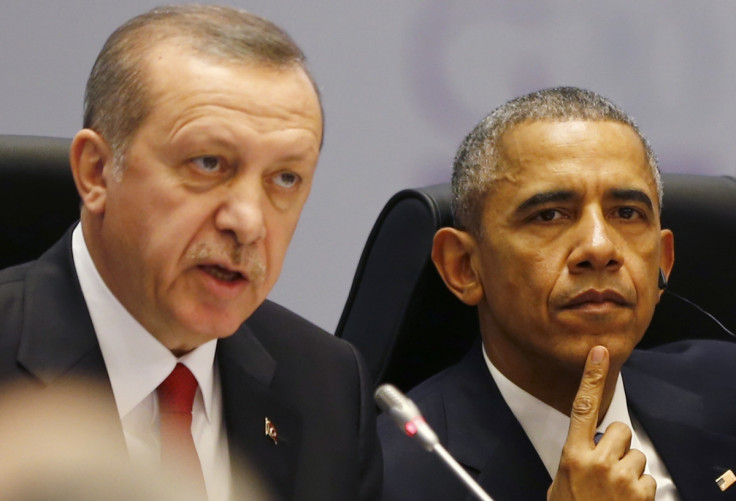Turkey: NATO's awkward member

Reuters on 01 December 2015 reported that a number of NATO members plan to send patrol aircraft and missiles to Turkey in order to "reassure" Ankara of their support after two of its F-16 warplanes downed a Russian fighter-bomber last week over Syrian territory.
Particularly vocal was Lithuania's Foreign Minister Linus Linkevicius who talked to Reuters reporters during meetings between NATO foreign ministers in Brussels:
"We must make full use of the capabilities we have to counter threats on NATO's southern flank. We must support our ally Turkey."
Other ministers at the meetings told Reuters:
"We remain determined...to continue developing additional NATO assurance measures and allies are working to prepare other contributions."
Meantime, NATO Secretary-General Jens Stoltenberg tried to assure everybody when stating that "a package" of measures was expected within weeks and to calm the situation by emphasizing the separation of any reinforcements from the (alleged) Russian air incursions into Turkish airspace, calling upon both countries to find a solution through dialogue.
Such a measured approach was supported by Germany's Foreign Minister, Frank-Walter Steinmeier who suggested that NATO envoys should arrange a special meeting with Russian counterparts and the Netherlands' Foreign Minister, Bert Koenders, who told reporters:
"There is a necessity to talk military (to) military between NATO and the Russian Federation to avoid these kinds of incidents, conflicts, because they are very risky."
More critical in tone at least, was former Chancellor and Foreign Minister of Austria, Wolfgang Schussel who, on Friday last week, told the state-owned Russia Today (RT) that the shooting down was a "nightmare incident" and "even if" the plane had encroached Turkish airspace for a few seconds, the Turkish reaction was not appropriate.
On 29 November, support for this viewpoint came from an unexpected source with RT quoting Israeli Defence Minister Moshe Yaalon who said that occasionally, Russian warplanes will stray into Israeli-controlled airspace but "...we must not automatically react and shoot them down when an error occurs" and Israeli General Amos Gilad said that there was a "hotline" with Russia: "Russian planes do not intend to attack us, which is why we must not automatically react...when an error occurs."
This neatly goes to the nub of this whole incident. Smaller states like Estonia who have a rather frosty relationship with Moscow and are frightened that the larger NATO members would not risk, say, thermonuclear war with Russia in their defence, appear to be most supportive of Turkey.
Yet the idea that the Russian jet's incursion – assuming Turkey is correct – for about 1.6 miles over a finger of land that juts into Syria posed any threat to Turkey or that this was some act of aggressive war against Turkey, is preposterous.
The Sukhoi-24M according to the Turks, crossed their territory in 17 seconds – what took it so long? – and was shot at from the rear by an F-16 of the Turkish Air Force when, according to the Russians, it was still 0.6 miles within Syrian airspace.
It is not disputed that when the F-16's air-to-air missile struck the Russian plane: the "stab in the back" being so unexpected that the Russian jet was not engaging any air-to-air missile countermeasures; the SU-24M was in Syria.
In a letter marked "MOST URGENT" to the United Nations in New York on 24 November, Turkey claimed that it did not know the nationality of the downed SU-24M.
A narrow field of candidates to be sure and a little odd. On 23 September 2014, Israel's Air Defence Command shot down a Syrian SU-24 when it flew nearly a kilometre into Israeli held airspace in the Golan Heights. It appears that Israel can tell when the SU is Russian and when it is Syrian, which is handy because Israel, as the foregoing mentioned, is not at war with Russia yet, has never signed any peace with Syria and technically is still at war with the Damascus regime.
Roger Boyes's Opinion article in Wednesday's Times (25 November 2015) entitled "How Isis can be defeated in four moves", presented his readers with a rather complex riddle which might help explain where Turkey really stands in this whole Syrian conflagration. It's that old maxim in so much of Middle East politics which seems particularly apt: the enemy of my enemy is my friend but with a really complex twist. Mr Boyce explains:
"...typically the enemy (Russia) of your enemy (Isis) is the best friend of the enemy (Syria) of my friend's (U.S.) ally's (Saudi Arabia) enemy's (Iran) friend (Hezbollah)".
Mr Boyce left out a very important element in this Byzantine puzzle, the only "Boots on the Ground" that are doing any really hard fighting against the enemy of all, Islamic State (IS). These "Boots" belong to the Kurds in both Iraq and Syria and of course, for too long, Turkey has viewed the Kurds and possibly still does, as their real enemy.
Only since 29 July this year has the United States Air Force been allowed to use Turkey's Incirlik Airbase for combat missions directed specifically against IS, an agreement with Ankara which expressly excludes any air support for Kurdish ground forces fighting IS in northern Syria.
This week, Britain's Parliament will probably vote to extend its bombing campaign against IS in Iraq to include IS in Syria. Eventually, with ground troops possibly from Syria, IS will be defeated. Most of Mr Boyce's riddle will still need solving.
© Copyright IBTimes 2025. All rights reserved.






















